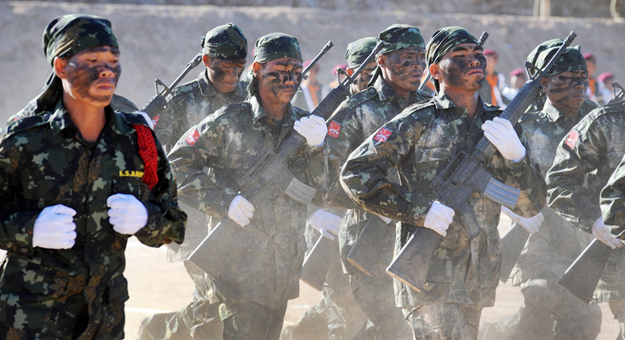[jj-ngg-jquery-slider html_id=”a_hard_life_in_loi_tai_laeng” gallery=”13″ effect=”fold” ]
Loi Tai Laeng, an unremarkable, incredibly dusty, dry little town of perhaps 2,000 Shan people, is strung along a high narrow ridge on the Burmese side of the Thai border with spectacular mountain views.
It becomes immediately obvious that life is tough here.
Bracingly cold at night and plagued by a chronic water shortage in the dry winter season, Loi Tai Laeng is typical of the frontier towns along the Thai-Burmese border—a mix of small, traditional thatched homes and others made of brick.
Many of the homes have hidden bunkers large enough to hold one or two families which have been dug into backyards and the sides of hills.
In 2008 the town suffered a sustained assault from the Burmese army which lasted 28 days before the Burmese retreated.
Loi Tai Laeng is the main base of the Shan State Army (SSA), which comprises several thousand armed troops. It is also the headquarters of the army’s political wing, the Restoration Council of Shan State (RCSS).
Six million Shans trace their roots to migrants from southern China who settled across Burma’s high plateau country roughly a millennium ago. They are ethnically closer to the Thai people than the Burmese plains people. In Loi Tai Laeng, many houses proudly display portraits of the much-revered Thai King Bhumibol, hung alongside portraits of their own Shan warlords.
Here people speak of “Burma” and the “Shan State” and refuse to utter the word “Myanmar,” which they say gives the appearance of a united country.
They resent being identified as Burmese, a people with whom they have traditionally waged war over many centuries and with whom they have fought an intermittent civil war for 65 years, during which their leaders say their people have suffered rape, forced relocation and the burning of homes, crops and villages with indiscriminate brutality.
In Loi Tai Laeng, there is an almost seamless blending of the army, political and social life. Residents from one day to the next slip easily from uniform to civilian attire and back, depending on their duties for the day. Many of the SSA officers also hold positions in the de facto Shan government.
Each home houses one or more members of the SSA, ranging from older veterans to teenage recruits, and you soon become used to the constant sight of Shan uniforms, AK47s and M16s.
There is also a modest clinic and a “national school” with an attached orphanage housing around 800 boys. Apparently only around 300 are orphans, the others being boys who lived at the school because of the school’s distance from their homes, and in some cases to avoid conscription into the Burmese Army. The school itself is chronically short of everything, from staff and teaching resources to water and the most basic needs of survival.
The medical clinic is also desperately short of medicines and experienced staff, and there appear to be no non-governmental organizations operating in the area.
Shan leaders say their main grievance with the Burmese stems from an agreement that they and other ethnic minorities reached with Burmese independence leader Aung San in 1947. Under this accord, known as the Panglong Agreement, the Shan were promised that they would have an opportunity to become independent after 10 years.
However, Aung San was assassinated later that year, and when the military seized power in 1962, the new regime of Gen Ne Win chose to ignore this agreement.
Shan leaders reject Burma’s new constitution because they say it was mainly drafted by generals and there was no input from ethnic minorities. They say the referendum held to in May 2008 to approve the draft charter was a sham and that its primary aim was to prolong the rule of the military regime while creating the illusion that Burma was moving towards democracy.
An officer described the tough conditions his men and women soldiers endure. They must carry a field pack of 30 kg or so, including enough food for three days and everything they need to live off the land.
The Shan patrols use the high mountain tracks, while the Burmese army controls the roads and towns in many of the valleys.
This means that for a Shan soldier to travel the length of Shan State from north to south can take up to four weeks, depending on Burmese army activity at the time.
While the Shan benefit sometimes from the high ground there are disadvantages as well.
The Shan operate with little or poor communications. A weak transmitter on a hilltop, which at the best of times could only be heard in a quarter of Shan State, had recently been knocked out in a lightning strike.
The Shan rebels face enormous challenges in transforming themselves from a military force into a political force that can participate in the rebuilding of a new Burma after 50 years of disastrous rule by military dictators who have showed little sympathy for their plight.
Suu Kyi, the 66-year-old Noble laureate who is regarded by many in central Burma and in the West as the country’s pro-democracy leader, is not seen by many Shan as their representative.
As one Shan leader put it, she is “on the same side as the army, just different.”
Restoring goodwill and trust with Burma’s numerous ethnic groups will clearly be one of the greatest challenges to face any incoming democratic Burmese government.

















